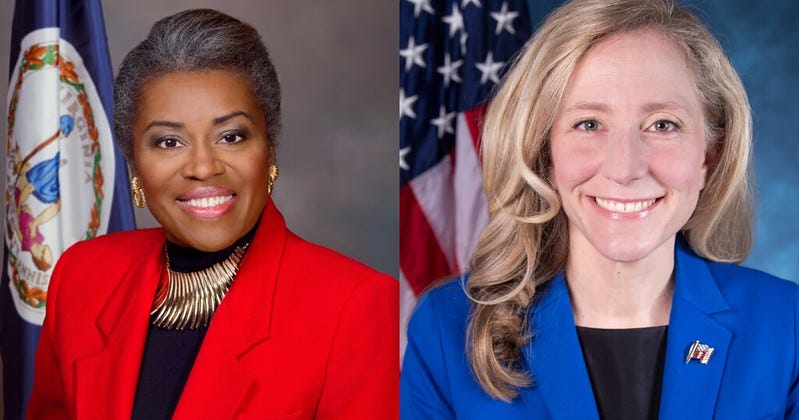FROM THE EDITOR: Gubernatorial Candidates Press Education - Can Either Deliver Better Outcomes?
Politicians and parents have held education hostage to "reform" for 40+ years. Why aren't we further along in educational outcomes? Because we keep placing solutions above understanding.
By Martin Davis
EDITOR-IN-CHIEF
Email Martin
That state of education in Virginia is poor. That’s according to both gubernatorial candidates.
Democratic candidate Abigail Spanberger’s Strengthening Virginia Schools Plan points to well-documented gaps in state support to schools, students’ poor showing in both reading and math recovery, the commonwealth’s teacher shortage, and poor school infrastructure as evidence.
Republican Winsome Earle-Sears has no formal education plan but argues our schools are failing and the only solution is to lean into school choice and parents’ rights.
In this way, both Spanberger and Earle-Sears would fall into the category of education “reformers.”
As Michael Petrilli of the Fordham Institute — an organization I once worked for — has pointed out, there was a time when the expression “school reform” was one that both sides of the political aisle fought for. That hasn’t been the case, he says, for over a decade as Republicans are now almost exclusively associated with the expression.
This year’s election suggests that the Democrats are ready to get back into the school reform game. And that is a good thing.
As Petrilli said: “I’m not happy that the GOP has emerged as the party of education reform—or, more specifically, the only party of education reform. Things were much better in the days when both teams fought for that mantle…. Take any issue you want (international trade, gay marriage, whatever) and any advocate will tell you that the dream scenario is for both parties to agree with your position.”
That both parties are engaged, however, is no guarantee that Virginia will get better educational results.
Same Old, Same Old
Both Spanberger and Earle-Sears are guilty of leaning on old educational tropes.
More money — Yes, money is an issue in education, and there isn’t enough to do what needs to be done. But Spanberger’s desire to “address long-standing gaps in state support to schools” and “[i]ncrease funding for teacher and school leader residency and apprenticeship programs” won’t necessarily result in improved academic performance. (More on the definition of academic performance in a moment.)
More choice — A common conservative argument is that if you let parents send their children where they wish, their academic performance will improve. Earle-Sears supports this idea by pushing for vouchers. The problem? There’s very little, if any, reliable data to back up the idea that voucher programs actually help students.
More programs — Innovative programming has a place in turning around academic achievement, but programs have a nasty way of getting gummed up by bureaucracy, especially when that bureaucracy is the Virginia Department of Education. So while Spanberger’s idea to stand up an Office of Public School Innovation within VDOE has merit, it’s as likely to add to the overbearing bureaucratic red tape schools and districts now have to navigate as it is to lead to a dramatic improvement in academic performance.
More standards — Both Earle-Sears and Spanberger want to tackle standards and assessments. Standards reform is not a quick fix, as this is a long, drawn-out fight. Both Spanberger and Earle-Sears are well aware of what Gov. Glenn Youngkin has been through the past four years revamping K-12 history standards. Earle-Sears promises to bridge the so-called “honesty gap,” whereby state scores show more achievement than the national NAEP exam shows. But doing this simply leaves schools doing what they do now — chasing test scores, not students learning.
It’s not that money, choice, programs, and standards don’t have a role to play in strengthening education. It’s that we’ve failed to define what better education looks like.
When politicians drive school improvement, we end up over and again with solutions in search of a well-defined problem.
What Does Success Look Like?
That Virginia has two candidates for governor willing to embrace education reform is an encouraging sign. And both Earle-Sears and Spanberger believe their ideas will push Virginia to be the best in the country.
Per Spanberger’s plan: “[Spanberger] believes that all parents deserve to know that their child will receive an outstanding education — one that challenges students and prepares them for success in their next steps in a career, a registered apprenticeship program, the military, or college.”
Per Earle-Sears’ plan: “Winsome will empower parents to choose the best school for their children so every child gets a quality education. She will prioritize parents’ rights and basic reading and math skills over ideological grandstanding. With Winsome in charge, Virginia’s education system will once again be the envy of the country.”
What’s lacking in both, however, is any clear definition of what success looks like.
Spanberger’s plan certainly has more flesh on it, and she outlines plans that she believes will prepare students for “success in their next steps in a career, a registered apprenticeship program, the military, or college.”
Does reaching these goals, however, require focusing on core academic subjects? Creating tracks that students pursue? Some combination thereof? And how do standards and assessments fit into this? Some core curriculum is necessary. Do we go heavy on workforce training and effectively limit liberal arts to a secondary role?
Earle-Sears’ plan is lean on details but heavy on belief in free markets and parental choice.
Should she become governor and open the floodgates of school choice, however, how are we to know she’s successful? Will giving vouchers to students lead to better educated students, or will it just become a way to put money into the pockets of companies that are high on promises and thin on results? And how will kids in rural areas benefit from vouchers when choices are limited to the few public schools in the area? Do we want to flow taxpayer dollars into religious schools?
One begins to see the problem.
Despite the differences in their approaches, both Earle-Sears and Spanberger do agree on two things — there is no single pathway to academic success. And we need to institute higher standards and more-rigid assessments to help guide students and parents in understanding their progress.
Let the new governor start there. And bring authorities to the table in both camps who can begin to think outside the box for how to construct an educational system that appreciates the strengths and weaknesses of both approaches and can construct more-creative solutions.
And then let the new governor take one more bold stance — commit to minimize the sprawling administrations that are collectively known as “central office” and funnel the money and personnel dedicated in those top-heavy bureaucratic institutions into actions that directly affect students, as opposed to spinning out more and more requirements that hand-tie teachers and confuse parents and teachers.
Public schools are the only institution large enough and experienced enough to pull off the kind of educational excellence we all want.
But these institutions — like the reform movements that for more than 40 years have sprung up around them — won’t move the needle in any meaningful way until we all quit putting solutions before understanding, and outcomes above individuals.
Local Obituaries
To view local obituaries or to send a note to family and loved ones, please visit the link that follows.
Support Award-winning, Locally Focused Journalism
The FXBG Advance cuts through the talking points to deliver both incisive and informative news about the issues, people, and organizations that daily affect your life. And we do it in a multi-partisan format that has no equal in this region. Over the past year, our reporting was:
First to break the story of Stafford Board of Supervisors dismissing a citizen library board member for “misconduct,” without informing the citizen or explaining what the person allegedly did wrong.
First to explain falling water levels in the Rappahannock Canal.
First to detail controversial traffic numbers submitted by Stafford staff on the Buc-ee’s project
Our media group also offers the most-extensive election coverage in the region and regular columnists like:
And our newsroom is led by the most-experienced and most-awarded journalists in the region — Adele Uphaus (Managing Editor and multiple VPA award-winner) and Martin Davis (Editor-in-Chief, 2022 Opinion Writer of the Year in Virginia and more than 25 years reporting from around the country and the world).
For just $8 a month, you can help support top-flight journalism that puts people over policies.
Your contributions 100% support our journalists.
Help us as we continue to grow!
This article is published under Creative Commons license CC BY-NC-ND. It can be distributed for noncommercial purposes and must include the following: “Published with permission by FXBG Advance.”















Always more money. Nothing to do with the students' ability to learn or drive to do so. You can't make a silk purse out of a sow's ear but the desire to learn needs to be there and self-initiative to make it happen. Forget more money.